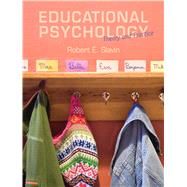Note: This is the loose-leaf version of Educational Psychology and does not include access to the Enhanced Pearson eText. To order the Enhanced Pearson eText packaged with the loose-leaf version, use ISBN 0133830853.
Educational Psychology: Theory and Practice gives tomorrow’s teachers the intellectual grounding and practical strategies they need to be effective instructors. Complete, up-to-date information is presented in readable, practical ways and illustrated with engaging examples, case studies, and embedded videos and interactive activities. The text makes the connection between theory and practice explicit, helping students to transfer what they learn to their own teaching. The Enhanced Pearson eText features engaging examples, case studies, and embedded videos and interactive activities.
Improve mastery and retention with the Enhanced Pearson eText*
The Enhanced Pearson eText provides a rich, interactive learning environment designed to improve student mastery of content. The Enhanced Pearson eText is:
- Engaging. The new interactive, multimedia learning features were developed by the authors and other subject-matter experts to deepen and enrich the learning experience.
- Convenient. Enjoy instant online access from your computer or download the Pearson eText App to read on or offline on your iPad® and Android® tablet.*
- Affordable. Experience the advantages of the Enhanced Pearson eText along with all the benefits of print for 40% to 50% less than a print bound book.
*The Enhanced eText features are only available in the Pearson eText format. They are not available in third-party eTexts or downloads.
*The Pearson eText App is available on Google Play and in the App Store. It requires Android OS 3.1-4, a 7” or 10” tablet, or iPad iOS 5.0 or later.
From reviews of the text:
"The strength of this text is that it takes a tremendous amount of information about human growth and development and constructivist/student-centered teaching and condenses it down into a readable textbook complete with added resources and study skill strategies... a phenomenal task."
-- Jane Thielemann-Downs, University of Houston Downtown
"[This text] is an amazing work that provides real-world scenarios, key terminology, and descriptions that are easily read and explained. This author was able to interface policies and theories into the practice and help the learner to realize the relevance and the integrity of the profession of Education as whole. The quotes and explanations are on target and the use of Connection and Pointers are great ... the rich discussion on hard-to discuss topics were marvelous."
-- Shirlyn Garrett-Wilson, Chicago State University








